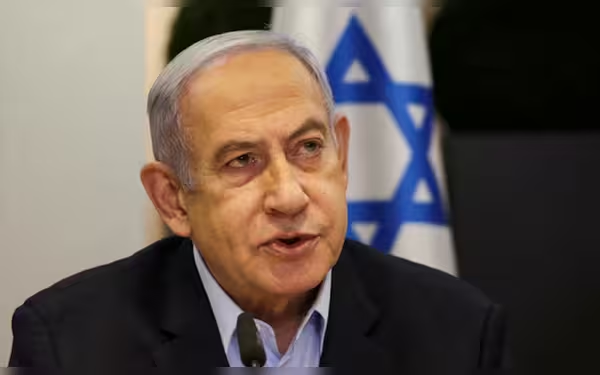Thursday, November 7, 2024 07:02 PM
Netanyahu Asserts Israel's Security in Lebanon Ceasefire Negotiations
- Netanyahu emphasizes Israel's security in ceasefire talks.
- Hezbollah attacks escalate violence in Lebanon.
- Humanitarian crisis worsens amid ongoing conflict.
 Image Credits: brecorder
Image Credits: brecorderNetanyahu stresses Israel's security in Lebanon ceasefire talks amid escalating violence and humanitarian crisis.
In recent developments, Israeli Prime Minister Benjamin Netanyahu has emphasized the importance of Israel's security in any potential ceasefire agreement with Lebanon. This statement comes in the wake of escalating violence, particularly following a Hezbollah attack that resulted in the deaths of five individuals, including an Israeli farmer and four foreign workers. The situation has become increasingly dire, with reports indicating that two additional civilians were killed by shrapnel near Kiryat Ata.
Netanyahu's remarks were made during a meeting with US envoys Brett McGurk and Amos Hochstein, who are currently in Israel to negotiate ceasefires in both Lebanon and Gaza. The Prime Minister stated, "The main issue is not the paperwork of this or that agreement, but Israel’s ability and determination to enforce the agreement and thwart any threat to its security from Lebanon." This highlights Israel's stance that any ceasefire must ensure its safety and the return of displaced individuals to northern regions.
As tensions rise, the humanitarian situation in Gaza continues to deteriorate, with Saudi Arabia's foreign minister accusing Israel of committing acts of "genocide" in its ongoing military operations. The conflict has not only affected Gaza but has also spilled over into southern Lebanon, where Israeli airstrikes have reportedly killed six health workers. The Lebanese health ministry has reported that over the past year, a total of 178 health workers have been killed or wounded due to Israeli strikes.
In response to the ongoing violence, Hezbollah has launched several rocket and artillery attacks against Israeli forces, particularly around the southern town of Khiyam. This area is strategically significant, as it is home to a large Shia community. Local officials have expressed their concerns about civilians caught in the crossfire, with the mayor of Wazzani pleading for assistance in evacuating vulnerable individuals, including women and children.
The situation remains fluid, with Israeli forces conducting airstrikes in areas like Baalbek, prompting many residents to flee. Thousands have sought refuge in nearby towns, where local authorities are struggling to meet their basic needs. The humanitarian crisis is exacerbated by the ongoing conflict, leaving many families in dire circumstances.
As the international community watches closely, the need for a sustainable resolution to the conflict becomes increasingly urgent. The complexities of the situation require careful negotiation and a commitment to peace from all parties involved. The hope is that through diplomatic efforts, a ceasefire can be achieved, allowing for the restoration of safety and stability in the region. Until then, the people affected by this conflict continue to endure unimaginable hardships, underscoring the critical need for humanitarian assistance and a lasting solution.













